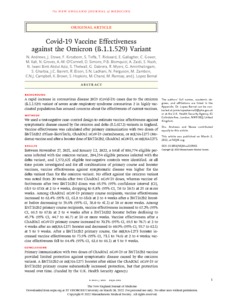Andrews, N;
Stowe, J;
Kirsebom, F;
Toffa, S;
Rickeard, T;
Gallagher, E;
Gower, C;
Kall, M;
Groves, N;
O'Connell, A-M;
et al.
Andrews, N; Stowe, J; Kirsebom, F; Toffa, S; Rickeard, T; Gallagher, E; Gower, C; Kall, M; Groves, N; O'Connell, A-M; Simons, D; Blomquist, PB; Zaidi, A; Nash, S; Iwani Binti Abdul Aziz, N; Thelwall, S; Dabrera, G; Myers, R; Amirthalingam, G; Gharbia, S; Barrett, JC; Elson, R; Ladhani, SN; Ferguson, N; Zambon, M; Campbell, CNJ; Brown, K; Hopkins, S; Chand, M; Ramsay, M; Lopez Bernal, J
(2022)
Covid-19 Vaccine Effectiveness against the Omicron (B.1.1.529) Variant.
N Engl J Med, 386.
pp. 1532-1546.
ISSN 1533-4406
https://doi.org/10.1056/NEJMoa2119451
SGUL Authors: Ladhani, Shamez Nizarali
![[img]](https://openaccess.sgul.ac.uk/114219/1.hassmallThumbnailVersion/nejmoa2119451.pdf)  Preview |
|
PDF
Published Version
Available under License ["licenses_description_publisher" not defined].
Download (512kB)
| Preview
|
Abstract
BACKGROUND: A rapid increase in coronavirus disease 2019 (Covid-19) cases due to the omicron (B.1.1.529) variant of severe acute respiratory syndrome coronavirus 2 in highly vaccinated populations has aroused concerns about the effectiveness of current vaccines. METHODS: We used a test-negative case-control design to estimate vaccine effectiveness against symptomatic disease caused by the omicron and delta (B.1.617.2) variants in England. Vaccine effectiveness was calculated after primary immunization with two doses of BNT162b2 (Pfizer-BioNTech), ChAdOx1 nCoV-19 (AstraZeneca), or mRNA-1273 (Moderna) vaccine and after a booster dose of BNT162b2, ChAdOx1 nCoV-19, or mRNA-1273. RESULTS: Between November 27, 2021, and January 12, 2022, a total of 886,774 eligible persons infected with the omicron variant, 204,154 eligible persons infected with the delta variant, and 1,572,621 eligible test-negative controls were identified. At all time points investigated and for all combinations of primary course and booster vaccines, vaccine effectiveness against symptomatic disease was higher for the delta variant than for the omicron variant. No effect against the omicron variant was noted from 20 weeks after two ChAdOx1 nCoV-19 doses, whereas vaccine effectiveness after two BNT162b2 doses was 65.5% (95% confidence interval [CI], 63.9 to 67.0) at 2 to 4 weeks, dropping to 8.8% (95% CI, 7.0 to 10.5) at 25 or more weeks. Among ChAdOx1 nCoV-19 primary course recipients, vaccine effectiveness increased to 62.4% (95% CI, 61.8 to 63.0) at 2 to 4 weeks after a BNT162b2 booster before decreasing to 39.6% (95% CI, 38.0 to 41.1) at 10 or more weeks. Among BNT162b2 primary course recipients, vaccine effectiveness increased to 67.2% (95% CI, 66.5 to 67.8) at 2 to 4 weeks after a BNT162b2 booster before declining to 45.7% (95% CI, 44.7 to 46.7) at 10 or more weeks. Vaccine effectiveness after a ChAdOx1 nCoV-19 primary course increased to 70.1% (95% CI, 69.5 to 70.7) at 2 to 4 weeks after an mRNA-1273 booster and decreased to 60.9% (95% CI, 59.7 to 62.1) at 5 to 9 weeks. After a BNT162b2 primary course, the mRNA-1273 booster increased vaccine effectiveness to 73.9% (95% CI, 73.1 to 74.6) at 2 to 4 weeks; vaccine effectiveness fell to 64.4% (95% CI, 62.6 to 66.1) at 5 to 9 weeks. CONCLUSIONS: Primary immunization with two doses of ChAdOx1 nCoV-19 or BNT162b2 vaccine provided limited protection against symptomatic disease caused by the omicron variant. A BNT162b2 or mRNA-1273 booster after either the ChAdOx1 nCoV-19 or BNT162b2 primary course substantially increased protection, but that protection waned over time. (Funded by the U.K. Health Security Agency.).
| Item Type: |
Article
|
| Additional Information: |
From New England Journal of Medicine, Andrews, N; Stowe, J; Kirsebom, F; Toffa, S; Rickeard, T; Gallagher, E; Gower, C; Kall, M; Groves, N; O'Connell, A-M; et al., Covid-19 Vaccine Effectiveness against the Omicron (B.1.1.529) Variant, 386:1532-1546. Copyright © 2022 Massachusetts Medical Society. Reprinted with permission. |
| Keywords: |
General & Internal Medicine, 11 Medical and Health Sciences |
| SGUL Research Institute / Research Centre: |
Academic Structure > Infection and Immunity Research Institute (INII) |
| Journal or Publication Title: |
N Engl J Med |
| ISSN: |
1533-4406 |
| Language: |
eng |
| Publisher License: |
Publisher's own licence |
| Projects: |
|
| PubMed ID: |
35249272 |
| Web of Science ID: |
WOS:000763184900001 |
| Dates: |
| Date |
Event |
| 2022-04-21 |
Published |
| 2022-03-02 |
Published Online |
|
 |
Go to PubMed abstract |
| URI: |
https://openaccess.sgul.ac.uk/id/eprint/114219 |
| Publisher's version: |
https://doi.org/10.1056/NEJMoa2119451 |
Statistics
Item downloaded times since 28 Mar 2022.
Actions (login required)
 |
Edit Item |



